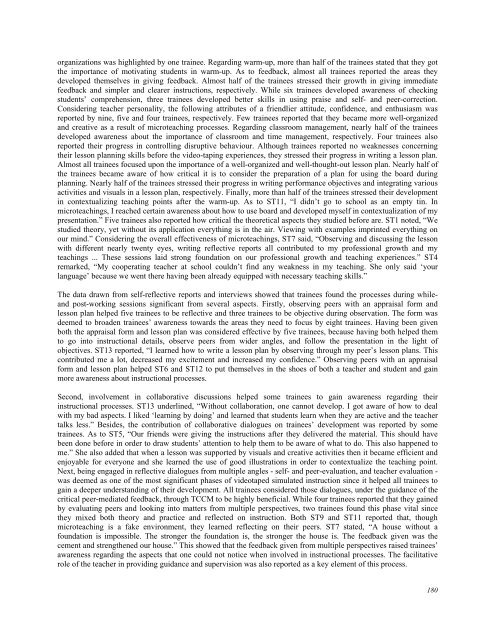January 2012 Volume 15 Number 1 - Educational Technology ...
January 2012 Volume 15 Number 1 - Educational Technology ...
January 2012 Volume 15 Number 1 - Educational Technology ...
Create successful ePaper yourself
Turn your PDF publications into a flip-book with our unique Google optimized e-Paper software.
organizations was highlighted by one trainee. Regarding warm-up, more than half of the trainees stated that they got<br />
the importance of motivating students in warm-up. As to feedback, almost all trainees reported the areas they<br />
developed themselves in giving feedback. Almost half of the trainees stressed their growth in giving immediate<br />
feedback and simpler and clearer instructions, respectively. While six trainees developed awareness of checking<br />
students’ comprehension, three trainees developed better skills in using praise and self- and peer-correction.<br />
Considering teacher personality, the following attributes of a friendlier attitude, confidence, and enthusiasm was<br />
reported by nine, five and four trainees, respectively. Few trainees reported that they became more well-organized<br />
and creative as a result of microteaching processes. Regarding classroom management, nearly half of the trainees<br />
developed awareness about the importance of classroom and time management, respectively. Four trainees also<br />
reported their progress in controlling disruptive behaviour. Although trainees reported no weaknesses concerning<br />
their lesson planning skills before the video-taping experiences, they stressed their progress in writing a lesson plan.<br />
Almost all trainees focused upon the importance of a well-organized and well-thought-out lesson plan. Nearly half of<br />
the trainees became aware of how critical it is to consider the preparation of a plan for using the board during<br />
planning. Nearly half of the trainees stressed their progress in writing performance objectives and integrating various<br />
activities and visuals in a lesson plan, respectively. Finally, more than half of the trainees stressed their development<br />
in contextualizing teaching points after the warm-up. As to ST11, “I didn’t go to school as an empty tin. In<br />
microteachings, I reached certain awareness about how to use board and developed myself in contextualization of my<br />
presentation.” Five trainees also reported how critical the theoretical aspects they studied before are. ST1 noted, “We<br />
studied theory, yet without its application everything is in the air. Viewing with examples imprinted everything on<br />
our mind.” Considering the overall effectiveness of microteachings, ST7 said, “Observing and discussing the lesson<br />
with different nearly twenty eyes, writing reflective reports all contributed to my professional growth and my<br />
teachings ... These sessions laid strong foundation on our professional growth and teaching experiences.” ST4<br />
remarked, “My cooperating teacher at school couldn’t find any weakness in my teaching. She only said ‘your<br />
language’ because we went there having been already equipped with necessary teaching skills.”<br />
The data drawn from self-reflective reports and interviews showed that trainees found the processes during while-<br />
and post-working sessions significant from several aspects. Firstly, observing peers with an appraisal form and<br />
lesson plan helped five trainees to be reflective and three trainees to be objective during observation. The form was<br />
deemed to broaden trainees’ awareness towards the areas they need to focus by eight trainees. Having been given<br />
both the appraisal form and lesson plan was considered effective by five trainees, because having both helped them<br />
to go into instructional details, observe peers from wider angles, and follow the presentation in the light of<br />
objectives. ST13 reported, “I learned how to write a lesson plan by observing through my peer’s lesson plans. This<br />
contributed me a lot, decreased my excitement and increased my confidence.” Observing peers with an appraisal<br />
form and lesson plan helped ST6 and ST12 to put themselves in the shoes of both a teacher and student and gain<br />
more awareness about instructional processes.<br />
Second, involvement in collaborative discussions helped some trainees to gain awareness regarding their<br />
instructional processes. ST13 underlined, “Without collaboration, one cannot develop. I got aware of how to deal<br />
with my bad aspects. I liked ‘learning by doing’ and learned that students learn when they are active and the teacher<br />
talks less.” Besides, the contribution of collaborative dialogues on trainees’ development was reported by some<br />
trainees. As to ST5, “Our friends were giving the instructions after they delivered the material. This should have<br />
been done before in order to draw students’ attention to help them to be aware of what to do. This also happened to<br />
me.” She also added that when a lesson was supported by visuals and creative activities then it became efficient and<br />
enjoyable for everyone and she learned the use of good illustrations in order to contextualize the teaching point.<br />
Next, being engaged in reflective dialogues from multiple angles - self- and peer-evaluation, and teacher evaluation -<br />
was deemed as one of the most significant phases of videotaped simulated instruction since it helped all trainees to<br />
gain a deeper understanding of their development. All trainees considered those dialogues, under the guidance of the<br />
critical peer-mediated feedback, through TCCM to be highly beneficial. While four trainees reported that they gained<br />
by evaluating peers and looking into matters from multiple perspectives, two trainees found this phase vital since<br />
they mixed both theory and practice and reflected on instruction. Both ST9 and ST11 reported that, though<br />
microteaching is a fake environment, they learned reflecting on their peers. ST7 stated, “A house without a<br />
foundation is impossible. The stronger the foundation is, the stronger the house is. The feedback given was the<br />
cement and strengthened our house.” This showed that the feedback given from multiple perspectives raised trainees’<br />
awareness regarding the aspects that one could not notice when involved in instructional processes. The facilitative<br />
role of the teacher in providing guidance and supervision was also reported as a key element of this process.<br />
180

















